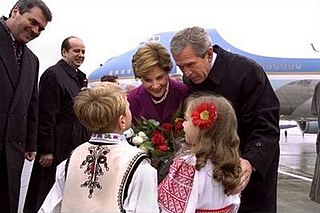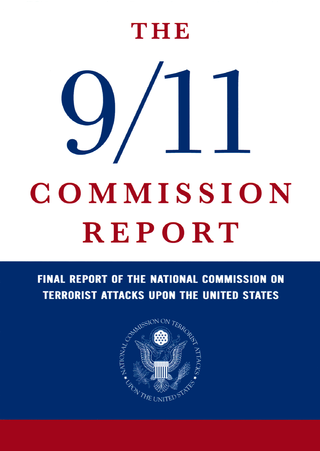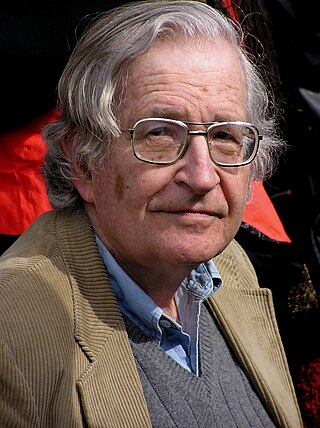"Rogue state" is a term applied by some international theorists to states that they consider threatening to the world's peace. These states meet certain criteria, such as being ruled by authoritarian or totalitarian governments that severely restrict human rights, sponsoring terrorism, or seeking to proliferate weapons of mass destruction. The term is used most by the United States ; in his speech at the United Nations (UN) in 2017, U.S. President Donald Trump reiterated this phrase. However, it has been applied by other countries as well.

The Federation of American Scientists (FAS) is an American nonprofit global policy think tank with the stated intent of using science and scientific analysis to attempt to make the world more secure. FAS was founded in 1946 by scientists, including and some who worked on the Manhattan Project, to develop the first atomic bombs. The Federation of American Scientists states that it aims to reduce the amount of nuclear weapons that are in use, and prevent nuclear and radiological terrorism. It says it aims to present high standards for nuclear energy's safety and security, illuminate government secrecy practices, as well as track and eliminate the global illicit trade of conventional, nuclear, biological and chemical weapons. With 100 sponsors, the Federation of American Scientists says that it promotes a safer and more secure world by developing and advancing solutions to important science and technology security policy problems by educating the public and policy makers, and promoting transparency through research and analysis to maximize impact on policy. FAS projects are organized in three main programs: nuclear security, government secrecy, and biosecurity. FAS has played a role in the control of atomic energy and weapons, as well as better international monitoring of atomic activities.

The National Commission on Terrorist Attacks Upon the United States, commonly known as the 9/11 Commission, was set up on November 27, 2002, to investigate all aspects of the September 11 attacks, the deadliest terrorist attack in world history. It was created by Congressional legislation, which charged it with preparing "a full and complete account of the circumstances surrounding the September 11 attacks", including preparedness by the U.S. federal government for the attacks, the response following the attacks, and steps that can be taken to guard against a future terrorist attack.

Thomas Howard Kean is an American businessman, academic administrator, and politician who served as the 48th governor of New Jersey from 1982 to 1990 and as president of Drew University from 1990 until 2005.

Hegemony or Survival: America's Quest for Global Dominance is a study of the American empire written by the American linguist and political activist Noam Chomsky, a professor at the Massachusetts Institute of Technology. It was first published in the United States in November 2003 by Metropolitan Books and then in the United Kingdom by Penguin Books.

Richard Alan Clarke is an American national security expert, novelist, and former government official. He served as the Counterterrorism Czar as the National Coordinator for Security, Infrastructure Protection, and Counter-Terrorism for the United States between 1998 and 2003.

Philip David Zelikow is an American diplomat, academic and author. He has worked as the executive director of the 9/11 Commission, director of the Miller Center of Public Affairs at the University of Virginia, and counselor of the United States Department of State. He is the White Burkett Miller Professor of History at the University of Virginia and was American Academy in Berlin Axel Springer Fellow, in the fall of 2009.
The Joint Inquiry into Intelligence Community Activities before and after the Terrorist Attacks of September 11, 2001, is the official name of the inquiry conducted by the Senate Select Committee on Intelligence and the House Permanent Select Committee on Intelligence into the activities of the U.S. Intelligence Community in connection with the attacks of September 11, 2001. The investigation began in February 2002 and the final report was released in December 2002.

The main event by far shaping the foreign policy of the United States during the presidency of George W. Bush (2001–2009) was the 9/11 terrorist attacks against the United States on September 11, 2001, and the subsequent war on terror. There was massive domestic and international support for destroying the attackers. With UN approval, US and NATO forces quickly invaded the attackers' base in Afghanistan and drove them out and the Taliban government that harbored them. It was the start of a 20-year quagmire that finally ended in failure with the withdrawal of United States troops from Afghanistan.

The 9/11 Commission Report, officially the Final Report of the National Commission on Terrorist Attacks Upon the United States, is the official report into the events leading up to the September 11, 2001 terrorist attacks. It was prepared by the 9/11 Commission, formally known as the National Commission on Terrorist Attacks Upon the United States, at the request of U.S. President George W. Bush and Congress. The report, which was released on July 22, 2004, was made immediately available publicly and remains available for sale or free download.

The Intelligence Reform and Terrorism Prevention Act of 2004 (IRTPA) is a 235-page Act of Congress, signed by President George W. Bush, that broadly affects United States federal terrorism laws. The act comprises several separate titles with varying subject issues. It was enacted in response to the terror attacks of September 11, 2001.
The Jersey Girls or Jersey Widows refers to four American women who lost their husbands in the September 11 attacks. All four—Kristen Breitweiser, Patty Casazza, Lorie Van Auken, and Mindy Kleinberg—were residents of New Jersey, and helped lobby the U.S. government to carry out an investigation into the terrorist attacks, resulting in the formation of the 9/11 Commission and the subsequent report released by the Commission.

Noam Chomsky is an intellectual, political activist, and critic of the foreign policy of the United States and other governments. Noam Chomsky describes himself as an anarcho-syndicalist and libertarian socialist, and is considered to be a key intellectual figure within the left wing of politics of the United States.
The Privacy and Civil Liberties Oversight Board (PCLOB) is an independent agency within the executive branch of the United States government, established by Congress in 2004 to advise the President and other senior executive branch officials to ensure that concerns with respect to privacy and civil liberties in the United States are appropriately considered in the development and implementation of all laws, regulations, and executive branch policies related to terrorism.

The Foundation for Rational Economics and Education (FREE) is an American libertarian organization. It was founded in 1976 by U.S. Congressman Ron Paul, who led the organization.
Criticism of the 9/11 Commission includes a variety of criticisms of the 9/11 Commission, the United States commission set up to investigate by the U.S. Congress and signed into law by then U.S. President George W. Bush to investigate the September 11, 2001 attacks, the deadliest terrorist attack in world history.
The Commission on the Prevention of Weapons of Mass Destruction Proliferation and Terrorism of the United States Congress was set up "to assess, within 180 days, any and all of the nation's activities, initiatives, and programs to prevent weapons of mass destruction proliferation and terrorism." The Graham/Talent WMD Commission was also asked to provide concrete recommendations- a roadmap- to address these threats.

Imperial Ambitions: Conversations with Noam Chomsky on the Post-9/11 World is a 2005 Metropolitan Books American Empire Project publication of interviews with American linguist and political activist Noam Chomsky conducted and edited by award-winning journalist David Barsamian of Alternative Radio.
Holder v. Humanitarian Law Project, 561 U.S. 1 (2010), was a case decided in June 2010 by the Supreme Court of the United States regarding the Patriot Act's prohibition on providing material support to foreign terrorist organizations. The case, petitioned by United States Attorney General Eric Holder, represents one of only two times in First Amendment jurisprudence that a restriction on political speech has overcome strict scrutiny. The other is Williams-Yulee v. Florida Bar.

Gaza in Crisis: Reflections on Israel's War against the Palestinians is a 2010 collection of interviews and essays from Noam Chomsky and Ilan Pappé that examine Israel's Operation Cast Lead and attempts to place it into the context of Israeli–Palestinian conflict. The book was edited by Frank Barat, who had conducted his first e-mail interview on the subject with Chomsky in 2005, as a result of his joint dialogue with Chomsky and Pappé, previously published as Le Champ du possible, which forms the heart of the work.












